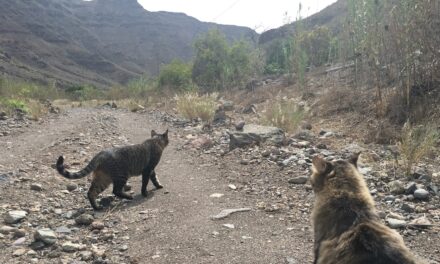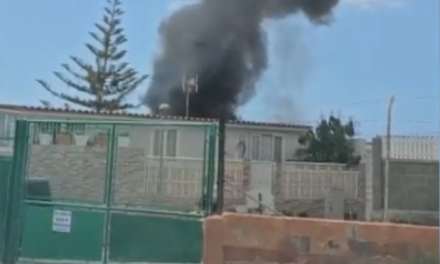The national diputado (Deputy – Member of Congress) for the province of Las Palmas and executive secretary for Refugee Policy of the governing [socialist] PSOE party, Luc André Diouf, has, this Monday, said how positively he values the work being done by the Government of Spain and the Canary Islands on the current migration crisis. The parliamentarian made clear that “without the development of cooperative policies, and work coordinated with countries of origin, it will not be possible to control the arrival of migrants to border regions, such as the Canary Islands.”
All this, he pointed out, is happening during a crisis aggravated by COVID-19 and the closure of borders in places where structural problems exist, such as those on the African continent, and where “people will continue to fight to leave their country to seek a better future”.
The deputy rejected “the accusations and the low vision” that representatives of the [regionalist] Coalición Canarias (CC) and the [conservative] Partido Popular (PP) are displaying, “with empty criticism, the falsification of data and without providing any solutions, but neither supporting any of the proposals put forward by the socialist party, which they systematically reject without analyzing them”. In turn, Diouf added that “both the Government of Ángel Víctor Torres and that of Pedro Sánchez are acting, in silence and from their offices, from where they work effectively.”
Diouf has been especially critical of the ex-president of the Canary Islands Government, the secretary general of the CC regionalists, Fernando Clavijo, after his latest statements on the migration crisis: “He is only looking for excuses to continue with his front-line position, and he forgets the shame of his immigration policy when he was in charge of the Canary Islands Executive ”. In this sense, he reminded regionalists that the Canarian Immigration Observatory spent more than 10 years without even once being convened, and part of the Guardia Civil’s Sistema Integrado de Vigilancia Exterior (SIVE) unit on Lanzarote were relegated to a warehouse, with the CC in Regional Government and the Cabildo de Lanzarote (Insular Council). One of the fundamental dimensions of this System is humanitarian, since the SIVE allows remote detection of vessels, which facilitates the identification and rapid assistance of victims of this form of human trafficking. SIVE helps not only to deter mafias from this type of trafficking, but also to save many human lives. An estimated 70% of all illicit traffic is detected in this way. Fuerteventura and Lanzarote operate three fixed radar stations and a transportable sensor station, coordinated by a Command and Control Center based in Fuerteventura. They all work in concert with active Guardia Civil liaison and training teams based in transit countries such as Morocco, Mauritania, Senegal and further afield, where they patrol to act as an early warning system for when suspected irregular migrant vessels head out to sea and attempt to reach the Spanish coasts, which mark the main southern frontier for the European Union.The Guardia Civil’s SIVE Integrated External Surveillance System
 Initiated in 2002 SIVE monitors coastal traffic travelling toward the Andalusian coast and the Canary Islands archipelago, working with Ceuta and Melilla, as they constitute the main gateways to Europe for illicit traffic from the African continent. They work with the European Frontiers Agency, Frontex, and the Maritime Rescue agency Salvamento Maritimo to detect drug trafficking and irregular immigration..
Initiated in 2002 SIVE monitors coastal traffic travelling toward the Andalusian coast and the Canary Islands archipelago, working with Ceuta and Melilla, as they constitute the main gateways to Europe for illicit traffic from the African continent. They work with the European Frontiers Agency, Frontex, and the Maritime Rescue agency Salvamento Maritimo to detect drug trafficking and irregular immigration..
Rounding off his scathing attack Luc André Diouf remarked of his opposition party rivals “They also dare to criticise the temporary reception of migrants in hotels, when the Canary Islands has been the only place in Europe that offered a dignified solution for these people, showing that this is not Lesbos or Moria”.
A global crisis
 As PSOE’s executive secretary for Refugee Policy Diouf insists that migration must be addressed from the African continent in concert with transit countries, as it is a global phenomenon. “Of course, it is the responsibility of the State and the European Union to address this situation, but also of the African Union, which is not assuming its responsibilities in the matter, especially in stopping the drain of its young people who are dying in the Atlantic”.
As PSOE’s executive secretary for Refugee Policy Diouf insists that migration must be addressed from the African continent in concert with transit countries, as it is a global phenomenon. “Of course, it is the responsibility of the State and the European Union to address this situation, but also of the African Union, which is not assuming its responsibilities in the matter, especially in stopping the drain of its young people who are dying in the Atlantic”.
On the other hand, he supports referrals to other territories, “because it is not operationally [achievable] for border regions such as the Canary Islands to bear the entire migratory burden,” although he acknowledges that this process, as well as repatriations, have been slowed down due to the pandemic and the controls that must be carried out on all people arriving on the islands.
Likewise, Luc André Diouf rejects the current European Migration and Asylum Pact and calls on the European Union for solidarity policies of redistribution and management of the current migratory crisis, “so that responsibilities are not diluted and all non-frontier states are involved.”
Finally, regarding the recent protests and manifestations of hatred, and the wide dissemination of hoaxes and xenophobic messages in the Archipelago, he urged all public representatives of the Canary Islands to continue working for equality and intercultural coexistence, and, in this sense, asked that the CC “not do the job for the extreme right, fueling the tension and division with statements that have no argumentative basis and that only seek confrontation and mere political conflict”. Luc André Diouf Dioh (born 18 January 1965) is a Spanish politician as well as a trade unionist and syndicalist. He is known in the Spanish media for being the first politician of African descent elected from the PSOE Spanish Socialist Workers’ Party, as well as for having been homeless in the past and having had to sleep on a Canary Islands beach for over a month. Educated in Dakar, he is only the second Diputado of African origin to be elected to the Congreso de Los Diputados de España, Spain’s lower house of parliament, and the very first Senegalese émigré to become a Spanish parliamentarian and national representative for the Province of Las Palmas. He is a vocal defender and advocate of human rights, inclusion and diversity and an outspoken opponent of far right, protectionist policies in Spain Luc André Diouf
Luc André Diouf














